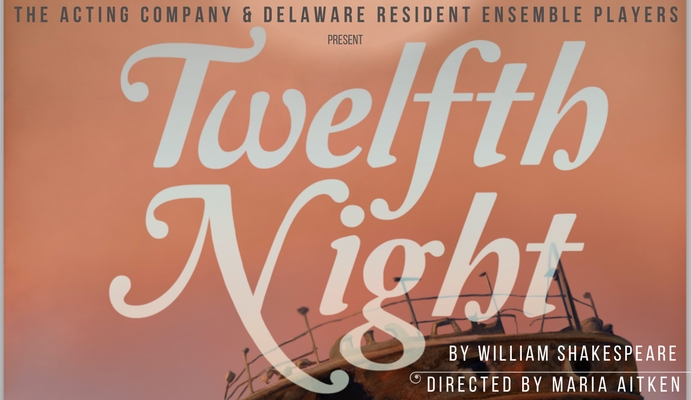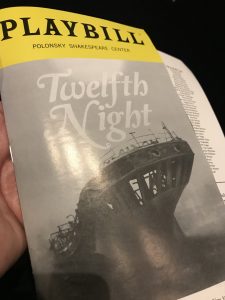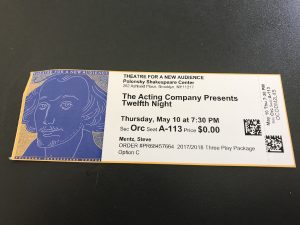 Maybe it’s just that I’ve seen Fiasco’s sea-shanty-filled Twelfth Night recently, or perhaps that the end of this particular spring semester brings the melancholy close of my research leave rather than joyous release from spring term classes, but I kept toggling between two thoughts last Thursday night as I watched the opening preview of The Acting Company’s Twelfth Night at Theater for a New Audience.
Maybe it’s just that I’ve seen Fiasco’s sea-shanty-filled Twelfth Night recently, or perhaps that the end of this particular spring semester brings the melancholy close of my research leave rather than joyous release from spring term classes, but I kept toggling between two thoughts last Thursday night as I watched the opening preview of The Acting Company’s Twelfth Night at Theater for a New Audience.
Mostly I thought that this play, maybe more than any other Shakespearean comedy, really can’t miss in performance. It’s so fun to watch!
And sometimes I wondered whether some of the hits were more glancing than they might have been. What lies beneath laughter?
The stand-out performances were Kate Forbes as a brilliantly conspiratorial and triumphant Maria who stole almost every scene she was in, and Joshua David Robinson as a soulful Feste. Both of these actors performed an emotional knowingness that left some meanings unspoken. The most resonant exchange of the night, it seemed to me, was Feste’s teasing suggestion to Maria about her prospects for making an elite marriage: “If Sir Toby would leave drinking, thou wert as witty a piece of Eve’s flesh as any in Illyria” (1.5). Neither needed to say more; overflow of feeling was left to Lee Ernst’s red-bearded Toby, Matthew Grier’s barely-contained Duke Orsino, and Susanna Stahmann’s wide-eyed Viola. 
The comic bits were wonderfully lively, especially the physical interplay between Viola-as-Cesario and the Duke. Elizabeth Heflin performed a stately Olivia whose costume changes structured her transformation from withdrawn mourner to eager bride.
In recent months I’ve been thinking a lot about romantic comedy and consent, ever since I found myself teaching Measure for Measure‘s depiction of sexual harassment and bed-trick near-assault, at the start of the #metoo moment last fall. (I wrote a bit about this after seeing Measure twice at the Public last fall.) Twelfth Night gently satirizes the erotic willfullness of overwhelming love, played mostly-sympathetically by Olivia and Viola, only partly disciplined in the case of Orsino, and cruelly mocked in Malvolio. None of these relationships really comes close, here or in the other comedies, to a courtship of consent, conversation, and mutuality. Perhaps Maria and Sir Toby, who play jokes together, come closest?
“Fate, show thy force,” says Viola in act 1, “ourselves we do not owe.” More than the conniving heroines of As You Like It or Merchant of Venice, Viola stages the fundamentally passive heroine of classical romance, enduring tribulations and anticipating the renewals of tide and time. Such an attitude of submission doesn’t mesh well with Enlightenment understandings of selfhood and reasoned choice. Reason and love aren’t often bedfellows in Shakespeare.
“What is yours to bestow is not yours to reserve”: Viola’s language, spoken by a disguised women to a withdrawn woman on behalf of an elite man, mirrors the phrasing of harassment. It’s no surprise, of course, to find sexualized violence lurking in Elizabethan comedies: not all of these plays are as overt as The Taming of the Shrew, but the undercurrent flows through them all. It’s a good thing that such patterns of male action and female passivity are becoming visible and problematic in this #metoo moment. I’m still working out how it’ll change my teaching, and all of our lives.
Go see this one before it closes on May 27!